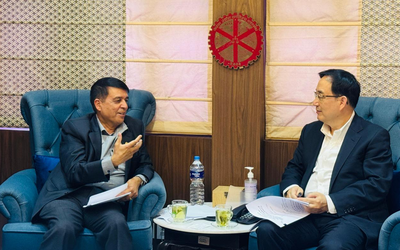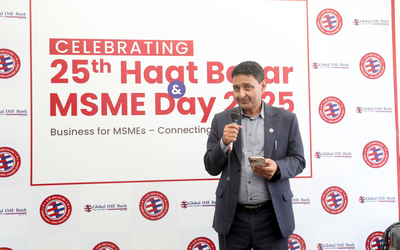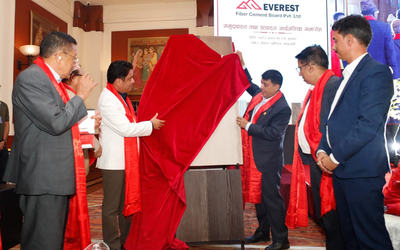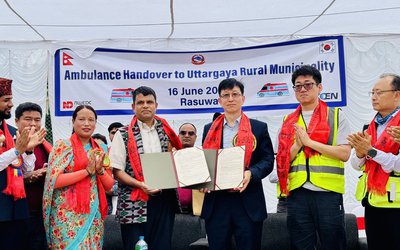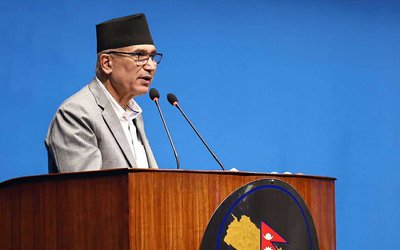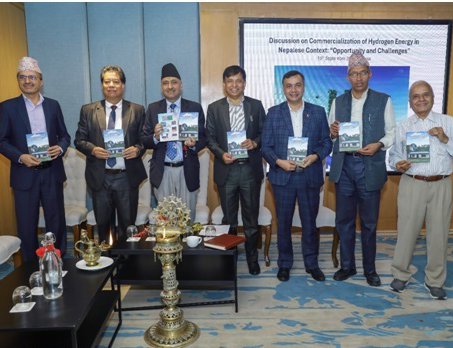
As Nepal embarks on its energy transition from fossil fuels to cleaner alternatives, the nation has committed to achieving zero emissions by 2045, making the commercialization of hydrogen energy essential.
Research indicates that relying solely on hydrogen energy and other renewable sources will not suffice to eliminate fossil fuel dependency entirely.
In this regard, the program hosted by the Nepal Energy Foundation (NEF), a non-governmental organization, holds significant relevance.
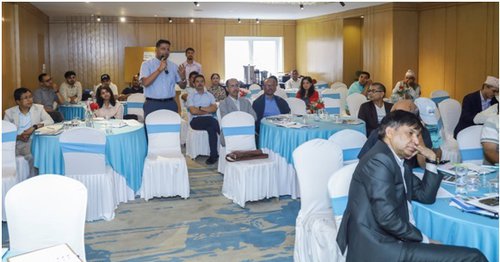
The primary aim of the event was to discuss potential sectors for the commercial use of green hydrogen, as well as the associated challenges, opportunities, and strategies for the successful commercialization of hydrogen energy in Nepal.
Representatives from various government agencies, including the Electricity Regulatory Commission (ERC), Nepal Electricity Authority (NEA), and the Alternative Energy Promotion Center (AEPC), along with stakeholders and practitioners from the clean energy sector, participated in the event.
The program was graced by Dr. Ram Prasad Dhital, Chairman of the ERC, as the chief guest. Other distinguished guests included Dr. Madhusudhan Adhikari, a member of the ERC; Nawaraj Dhakal, Managing Director of AEPC; Achyut Ghimire, Director of Planning and Technical Services at NEA; and Uttar Kumar Shrestha, Managing Director of Butwal Power Company Ltd., along with various experts from the sector.
During the event, the chief guest and special guests launched the book "Micro Hydro and Sustainable Practice," authored by Krishna Adhikari, as well as the annual report of NEF. Nepal's energy sector is steadily advancing towards a sustainable transition, guided by the national climate and energy policy, which establishes ambitious targets aligned with Sustainable Development Goals (SDGs) 7 and 13. These goals emphasize the importance of adopting cleaner energy sources, particularly in the transportation and cooking sectors.
In a recent discussion program, Sher Singh Bhat, Vice Chairman of NEF, delivered a presentation on the theme: "Commercialization of Hydrogen Energy in the Context of Nepal: Opportunities and Challenges." He highlighted three primary sectors that significantly rely on imported commercial fuels and possess substantial potential for transitioning to hydrogen energy: Transportation, Residential (cooking and heating), and Industrial (specifically for furnaces utilizing industrial oils like furnace oil).
Bhat's presentation underscored the financial viability of hydrogen, stressing the necessity for it to compete with the existing fossil fuel infrastructure within the transportation and residential sectors, as well as outlining strategies for initiating the substitution of industrial fuels. He provided a calculation-based analysis aimed at identifying the optimal levelized cost of hydrogen (LCOH) required for hydrogen to emerge as a cost-effective and feasible alternative.
As Nepal advances towards its Nationally Determined Contribution (NDC) targets, which include a significant emphasis on electric vehicles (EVs) by 2025, the transportation sector encounters considerable challenges.
Although private EVs are gaining popularity, the transition in public transportation, particularly for heavy-duty vehicles such as buses and trucks, remains problematic, as battery electric vehicles (BEVs) frequently fall short of meeting the energy demands of larger fleets. Given its superior energy density, hydrogen is ideally suited to fulfill the energy requirements of heavy-duty transportation.
Bhat provided a comprehensive cost analysis to demonstrate the price point at which hydrogen can effectively compete with existing gasoline prices. He identified two primary price benchmarks:
NOC purchase price benchmark:
This benchmark pertains to the price at which the Nepal Oil Corporation (NOC) acquires gasoline, excluding the six types of taxes and duties imposed by the Government of Nepal (GON) on gasoline imports, such as VAT and excise duties, along with handling costs and losses due to evaporation. Currently, this benchmark is established at NPR 88 per liter, necessitating that the indicative cost per kilometer for hydrogen fuel be limited to NPR 7.33. Consequently, the price of hydrogen must not surpass NPR 703.68 per kilogram.
Consumer price benchmark
This benchmark indicates the price consumers pay for gasoline, which includes VAT and excise taxes, currently set at NPR 163 per liter.
In order to compete with this consumer price, the indicative cost of hydrogen per kilometer should not exceed NPR 13.58, implying that hydrogen must be priced below NPR 1304.88 per kilogram.
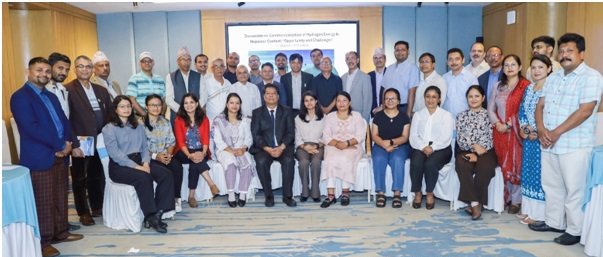
Achieving these benchmark costs is crucial for hydrogen to successfully compete with gasoline and position itself as a viable cost-effective alternative in Nepal's transportation sector.
In the context of cooking applications, the event underscored Nepal's Nationally Determined Contribution (NDC) goal of reaching 25% electric cooking by the year 2030. However, progress towards this target has been minimal, with only 1% advancement recorded to date.
The sluggish uptake of electric cooking technologies can be attributed to user reluctance towards flameless cooking methods and various technical obstacles. As the use of traditional biomass for cooking diminishes, there has been a notable increase in the reliance on liquefied petroleum gas (LPG), which raises significant concerns regarding energy security and the nation's dependence on imported fossil fuels.
In contrast, hydrogen fuel presents a viable and eco-friendly alternative. Unlike electric cooking technologies that necessitate specialized cookware and encounter challenges in user acceptance as a primary cooking fuel, hydrogen cooking systems are user-friendly and do not require any special utensils. In a manner similar to the analysis conducted in the transportation sector, Bhat provided a cost analysis to evaluate how hydrogen can effectively compete with LPG and electric cooking technologies.
To be competitive with LPG pricing, hydrogen must maintain a cost per kilowatt-hour of no more than NPR 11. This requirement translates to a hydrogen price of NPR 363 per kilogram, based on the current LPG price of NPR 2000 for a 14.7 kg cylinder.
The benchmark for e-cooking pricing indicates that for hydrogen to be a viable competitor, its cost per kilowatt-hour must fall below NPR 11.70. This suggests that the price of hydrogen should not exceed NPR 386 per kilogram. Consequently, a target price of Rs 12 per kWh or lower for hydrogen combustion would position it competitively against current cooking energy sources, such as electricity and LPG.
Bhat highlighted that substituting a standard 14.7 kg LPG cylinder would necessitate approximately 5 kg of hydrogen. Therefore, to ensure affordability and competitiveness, the price of a 5 kg hydrogen cylinder should be limited to below NPR 2000. Achieving these pricing objectives will enable hydrogen to effectively rival LPG and electric cooking methods, offering a cleaner and more sustainable alternative for cooking in Nepal, in addition to the various advantages hydrogen presents over LPG and electricity as cooking fuels.
In the discussions, participants expressed appreciation for the information shared within the context of Nepal. There was significant interest regarding the costs associated with hydrogen production, safety concerns, and the challenges related to storage and transportation for end-use applications, as well as issues of social acceptance and behavior modification.
The ongoing research conducted by the NEF has pinpointed the essential measures required, and upon the successful completion of this research, further initiatives will be necessary to ensure that the system is economically competitive with current fuel options.
Participants raised concerns regarding the permitting processes for hydrogen production facilities and highlighted the necessity for government regulations to expedite the commercial adoption of hydrogen. In their concluding statements, chief guest Dr. Ramprasad Dhital, along with special guests Dr. Madhusudhan Adhikari, Nawaraj Dhakal, and Achyut Ghimire, underscored the considerable potential of hydrogen fuel in facilitating Nepal's shift towards cleaner energy alternatives.
By achieving the specified cost benchmarks, hydrogen could emerge as a feasible substitute for traditional fossil fuels, thereby supporting Nepal's aspirations for a more sustainable and eco-friendly energy landscape. At the conclusion of the event, NEF Chairman Mohandas Manandhar expressed gratitude to all participants for their engagement and formally closed the proceedings.
- The Situation Pushes Women Journalists To Speak Louder, Experts Emphasize
- Jun 30, 2025
- SPI NEPAL: Prosperity Through Clean Energy
- Jun 30, 2025
- PM Oli Meets Spanish Prime Minister
- Jun 30, 2025
- FM Dr. Rana Said Nepal recognises constitutional guarantees to citizens' right to food
- Jun 30, 2025
- Weather Forecast: Generally Cloudy With Heavy Rainfall Is Likely In One Or Two Places Of Kathamandu, Biratnagar And Pokhara
- Jun 30, 2025

